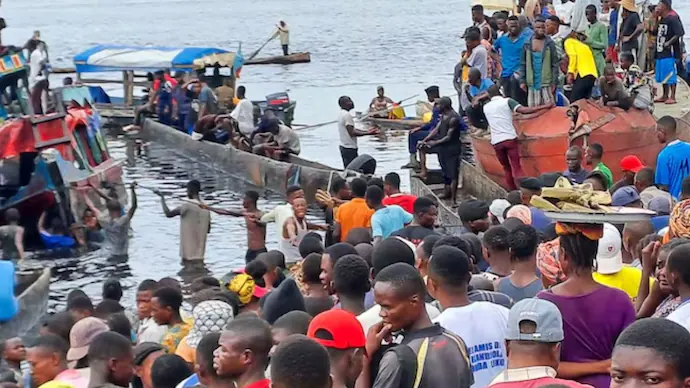In one of the deadliest maritime disasters in the Democratic Republic of Congo’s recent history, at least 148 people have been confirmed dead following a catastrophic fire and capsizing of a passenger boat on the Congo River. Officials fear the final death toll could climb much higher, as hundreds of passengers remain missing.

According to local authorities, the tragedy began when a woman cooking on board the motorized wooden boat accidentally started a fire. The flames rapidly engulfed the vessel, named HB Kongolo, which was carrying an estimated 500 people when the incident occurred on Tuesday night. The boat had departed from the port of Matankumu and was en route to the Bolomba territory before the disaster struck near the northwestern town of Mbandaka.
Senator Jean-Paul Boketsu Bofili of Équateur province confirmed on Friday that the official death toll had surged to 148. “As we speak, more than 150 survivors suffering from third-degree burns are without humanitarian assistance,” he said, underscoring the scale of the crisis and the urgent need for medical aid.
Tragically, many of the fatalities occurred when passengers—particularly women and children—jumped into the river in a desperate attempt to escape the flames. Most were unable to swim and drowned in the strong currents of the Congo River, officials said. Local river commissioner Competent Loyoko confirmed that the fire started due to cooking activity on the deck, a common but hazardous practice on long river voyages in the region.
Approximately 100 survivors were taken to an improvised shelter at the town hall of Mbandaka, while others suffering severe burn injuries were transported to local hospitals. Medical personnel have described dire conditions as facilities are overwhelmed, with many patients in urgent need of advanced burn treatment and surgery.
Deadly boat accidents are tragically frequent in the Democratic Republic of Congo, where waterways serve as a primary mode of transportation for millions, particularly in remote provinces where road infrastructure is virtually nonexistent. With a population exceeding 100 million, the vast nation relies heavily on rivers for the movement of people and goods. However, safety standards remain lax, and many boats operate without proper regulation or oversight.
Late-night departures, overloading of vessels, and a lack of basic safety equipment such as life vests are common across the country’s water transport system. In recent years, several high-profile accidents have led to mass casualties, yet enforcement of maritime safety laws remains weak.
The HB Kongolo disaster adds to this grim legacy. Witnesses report that the vessel was not only overloaded but lacked emergency response tools to handle a fire. Survivors described chaos as the blaze spread quickly, igniting fuel and cargo, and causing a stampede toward the riverbanks.
In the wake of the disaster, local officials have called for an immediate review of river safety protocols and stricter regulation of passenger boats. Senator Bofili has appealed for humanitarian organizations and the national government to urgently dispatch aid to Mbandaka and other affected areas.
Calls are also growing for the creation of a river safety authority with the power to regulate passenger numbers, enforce equipment requirements, and train boat crews in emergency preparedness. Without such reforms, analysts warn that similar tragedies will continue to occur.
President Félix Tshisekedi has yet to make a public statement about the accident, though a presidential spokesperson confirmed that the administration was monitoring the situation closely and would coordinate with local health services.
The Congo River, the second-longest in Africa, has long been a vital lifeline for communities across the country. Yet its role as a major transportation artery is fraught with danger due to systemic neglect and underinvestment in water transport safety.
As rescue and recovery operations continue, families await news of missing loved ones. For many, the loss of life is not just a personal tragedy but a reminder of the urgent need for reform in a nation that depends on its rivers but too often overlooks their risks.



